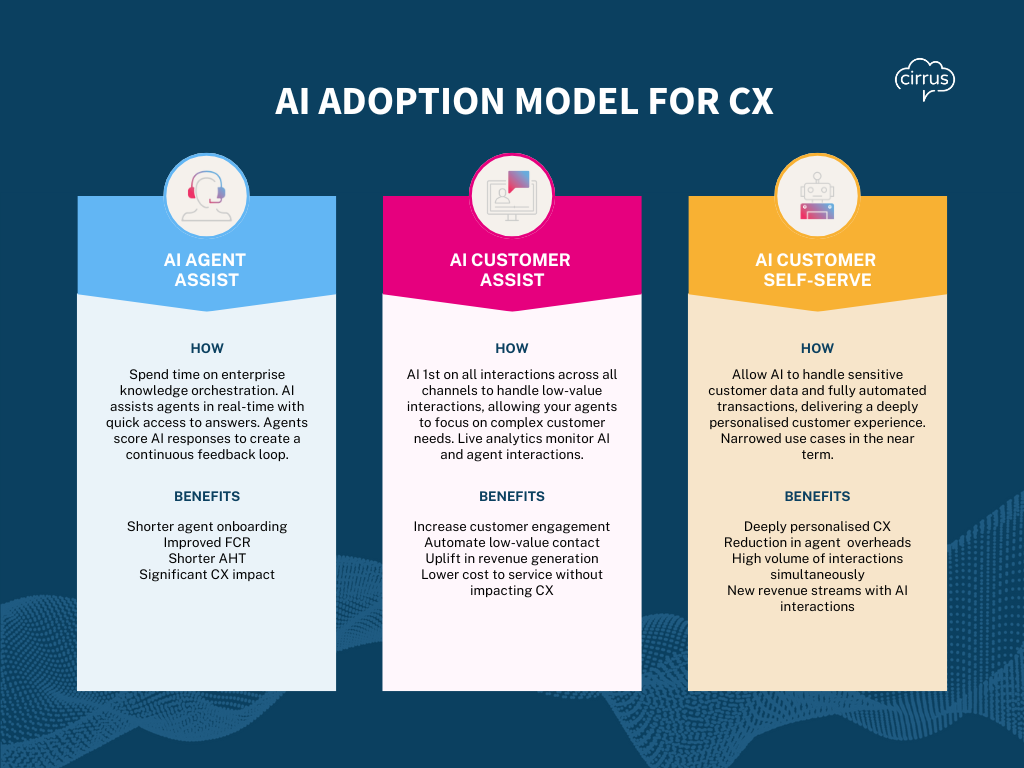Many businesses recognise the potential of AI to transform their contact centres. However, the journey to AI adoption can be daunting. Where do you even begin? Diving headfirst can lead to poorly planned implementations that disappoint and leave you scrambling to roll back solutions that aren’t delivering the promised benefits.
At Cirrus, a leader in contact centre technology, we’re committed to developing innovative AI solutions that empower businesses to deliver exceptional customer experiences. We understand the challenges associated with AI adoption, which is why we’ve developed a clear, phased approach that ensures a smooth transition and maximises the value of AI for your contact centre.
The Directors Club recently hosted the Contact Centre AI EXPO, an event dedicated to exploring cutting-edge AI applications that are revolutionising customer interactions. As a leader in contact centre technology, Cirrus was proud to participate and share our latest developments in AI-powered solutions.
Our CEO, Jason Roos, took the stage to outline Cirrus’ approach to AI adoption in contact centres, breaking it down into three distinct phases:
Three Phases of AI Adoption
Phase 1 | AI Agent Assist: The Foundation of AI Integration
The first step in your AI journey is empowering your human agents. AI Agent Assist provides real-time support for agents during customer interactions. Agents have instant access to relevant knowledge articles, suggested responses tailored to the conversation, and gentle nudges to ensure compliance with regulations. This not only improves first contact resolution and reduces average handling time, but also empowers agents to deliver exceptional service from day one, thanks to faster onboarding times.
The key here is that AI supports agents, not replaces them. Customers continue to interact with a friendly, knowledgeable human, but AI ensures they have the information and guidance needed to resolve issues quickly and efficiently.
Spend time on enterprise knowledge orchestration in Phase 1
Phase 1 isn’t just about empowering agents, it’s about empowering your AI as well. This approach addresses a crucial but often overlooked step: enterprise knowledge orchestration. You likely have a wealth of information about your products, services, and organisation. But that information is currently scattered and formatted for different audiences. Phase 1 is critical for getting your AI on the right track by organising this knowledge for effective AI training. During Phase 1, agents score and validate AI responses, creating a continuous feedback loop crucial for refining and improving the AI’s accuracy and effectiveness over time.
Importantly, you achieve this while laying the groundwork for future AI advancements, all without the risks associated with unrefined AI directly interacting with customers.
Phase 2 | AI Customer Assist: Enhancing Customer Interactions
As your comfort with AI grows, you can introduce AI Customer Assist. This phase leverages AI-powered chatbots to handle initial customer inquiries across all channels, including voice, chat, and email. These intelligent chatbots can answer simple questions, resolve routine issues without human intervention, and intelligently route complex inquiries to the most appropriate agent. This not only frees up valuable agent time for more strategic tasks, but also provides customers with 24/7 availability for initial support, enhancing the overall customer experience. A crucial component of this phase is the use of live analytics platforms to monitor all contacts, both AI-handled and agent-handled. This quickly identifies any issues or inaccuracies in AI responses and ensures quality and consistency across all customer interactions.
Phase 3 | AI Customer Self-serve: The Future of Personalised Service
While still on the horizon for many businesses, Phase 3 offers a glimpse into the exciting future of AI-powered contact centres. AI Customer Self-Serve empowers customers to handle a wider range of interactions independently, leveraging AI’s ability to personalise service and handle complex transactions. Imagine a future where AI can access (with appropriate safeguards) a customer’s history and preferences to provide highly personalised recommendations, proactively offer solutions to anticipate needs, and even facilitate complex transactions like account updates or purchases.
However, Jason emphasizes the importance of robust privacy safeguards and building customer trust for this advanced phase.

The Power of Agent Assist: Demonstration
Jason then demonstrated how Cirrus’ Agent Assist technology works in real-time, providing agents with instant access to relevant information and suggestions during customer interactions. This technology has shown impressive results, including shortened onboarding times, improved first contact resolution, and reduced average handling times. (If you want to see this demonstration, contact us here.)
An increase in agents?
While highlighting the operational efficiency benefits of AI-powered customer interactions, Jason noted that as AI takes on more customer-facing roles, there might paradoxically be an increased demand for human agents. The efficiency and speed of AI will create an expectation of instant resolution. When customers reach a more complex issue and require handoff to a live agent, waiting times will become particularly frustrating.
Real-World Results
Cats Protection, a valued Cirrus customer, implemented AI Customer Assist and saw a remarkable 33% increase in calls handled without adding new agents. Their AI system now manages around 1,000 interactions per month, resolving low-value conversations and reducing call abandonment rates from 16% to 7%. This is just one example of how AI is transforming contact centres and delivering real business value.
The Future of Contact Centre AI
Looking ahead, Jason discussed the potential for AI to handle more complex, revenue-generating transactions. However, he noted that this would require robust privacy safeguards and deep personalisation capabilities.
By outlining these phases, Jason provided a roadmap for organisations to gradually integrate AI into their contact centre operations. This phased approach allows businesses to realise immediate benefits while preparing for more advanced AI applications in the future, always keeping the balance between automation efficiency and the human touch that customers often prefer for complex or emotionally nuanced interactions.
The Contact Centre AI EXPO provided an excellent platform for industry leaders like Cirrus to showcase their innovations and share insights. As AI continues to evolve, it’s clear that it will play an increasingly important role in shaping the future of customer interactions.
If you would like to learn more about this phased approach, please get in touch.






